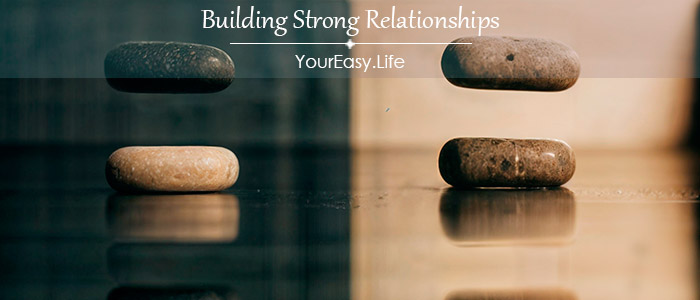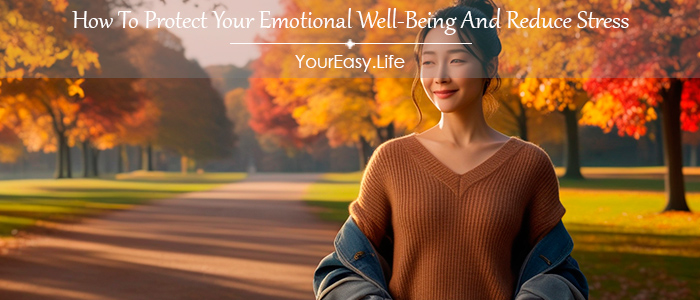Emotional wellness is a key aspect of our lives that impacts physical health, interpersonal relationships, and overall life satisfaction. Moreover, maintaining emotional health allows us to better handle daily stresses, make sound decisions, and enjoy each moment.
In this article, we will share practical tips and methods to improve your emotional health and achieve a more balanced life. We understand that even the simplest steps can seem challenging, especially if you lack energy or motivation. Our goal is to help you overcome these barriers and find your path to a happier and YourEasy.Life.
Table Of Contents
Understanding Emotional Wellness
Emotional wellness is the ability to be aware of, understand, and manage your emotions, cope with stress, and maintain positive relationships with others. It is a crucial component of overall health and quality of life.
Impact On Physical Health
Studies show that positive emotions and stable emotional states strengthen the immune system, reduce the risk of cardiovascular diseases, and improve overall physical well-being. Consequently, emotional wellness helps us maintain a healthy lifestyle that includes proper nutrition, regular physical exercise, and adequate sleep.
Improving Interpersonal Relationships
When we are emotionally balanced, it is easier to establish and maintain healthy relationships with others. This allows us to be more attentive and empathetic, avoid conflicts, and effectively resolve problems. Thus, emotional wellness helps us be more tolerant and open, fostering strong and trusting relationships.
Increasing Productivity And Motivation
People with high levels of emotional wellness are often more motivated and productive. They handle tasks more easily, adapt to changes more quickly, and show greater creativity in problem-solving. Emotional health helps us stay focused and energetic, enhancing our efficiency in both personal and professional life.
Overall Life Satisfaction
Emotional wellness is closely linked to feelings of happiness and life satisfaction. It helps us enjoy daily joys, appreciate moments spent with loved ones, and find meaning in what we do. Maintaining emotional health allows us to be more optimistic and grateful for what we have.
How Is Stress Management Related To Emotional Wellness?
Stress management plays a crucial role in maintaining emotional wellness. Stress is a natural response to physical or emotional demands, but when it becomes chronic or excessive, it can seriously harm our health and mental state.
Reducing Negative Health Impacts
Chronic stress can lead to various physical problems, such as hypertension, cardiovascular diseases, sleep disturbances, and weakened immune system. Effective stress management helps reduce these negative impacts, promoting overall physical and emotional well-being.
Improving Mood And Emotional Wellness
Stress is often accompanied by negative emotions like anxiety, irritation, and depression. By managing stress, we reduce the intensity of these negative emotions, improving our mood and increasing our sense of life satisfaction.
Enhancing Productivity
When stressed, our ability to concentrate and make decisions decreases. Stress management helps improve cognitive functions, increase focus, and boost productivity. This is particularly important for effective work and goal achievement, positively influencing our emotional wellness.
Strengthening Interpersonal Relationships
Stress can negatively affect our relationships with others. We become more irritable and prone to conflicts. Effective stress management helps us remain calm and resilient in difficult situations, improving interpersonal relationships and creating a more supportive and positive social environment.
Improving Adaptability
Life is full of changes and uncertainties, and stress is a natural reaction to new and unfamiliar situations. Stress management helps us better adapt to changes, maintain emotional balance, and find effective ways to solve emerging problems.

Stress Management Methods
Breathing Exercises
Deep breathing and other breathing techniques help quickly calm down and reduce stress levels. If you don’t know how to breathe, try the simplest technique: inhale for a count of four, hold your breath for a count of four, and exhale for a count of four. It’s simple and effective. You’ll be surprised at how quickly you feel better.
Meditation
Meditation helps calm the mind, improve concentration, and reduce stress levels. Popular techniques include mindfulness and deep breathing. Start with 5 minutes of meditation a day and gradually increase the time. We understand that you may have a busy schedule, but try to find just 5 minutes a day — it’s a small amount of time that can bring significant results. And if you find it hard to focus, don’t worry, meditation is a practice, and the more you practice, the easier it becomes.
Physical Activity
Regular physical exercise promotes the release of endorphins, which improve mood and reduce stress. Choose an activity you enjoy, whether it’s running, yoga, or swimming. And if you think you don’t have time for workouts or are too tired for them, start with small steps — a 10-minute walk or light stretches at home, for example. Over time, you’ll feel better and be able to increase the duration and intensity of your sessions.
Relaxation Techniques
Relaxation methods, such as progressive muscle relaxation (PMR) and aromatherapy, help relax and reduce tension. If you think this won’t work for you or will be too difficult, just try it a few times and give yourself time to get used to it, because relaxation techniques require practice.
Art Therapy
Drawing, sculpting, or any other creative activity can help express emotions and reduce stress levels. For example, automatic drawing allows you to express emotions and subconscious thoughts without conscious control. You just let your hand move freely on the paper without thinking about the final result. This process helps reveal suppressed emotions and stimulate the creative process. And it doesn’t matter if you know how to draw or not. In art therapy, the process is more important than the result. Allow yourself the freedom of expression, and you’ll see how it can help you relax.
Social Support
Communicating with friends and loved ones helps reduce stress and improve emotional wellness. Even a short call or message can have a significant impact. Find a little time for communication, and you’ll feel better.
Journaling
Writing down your thoughts and feelings helps make sense of experiences and reduce stress levels. You may not like writing or think you don’t have time for it. Start with small entries, such as a few sentences about your day. Over time, you may find this activity more enjoyable and beneficial.
Nature Therapy
Being in nature, walking in the park, or hiking helps relax and restore energy. You may live in a city and have no time for nature. Find the nearest park or green area. Even a short walk in the fresh air can bring significant relief.
Autogenic Training
A self-hypnosis technique aimed at muscle relaxation and mind calming. It sounds somewhat complex, but start with simple muscle relaxation exercises and gradually move on to more advanced techniques. There are many guides and apps that can help you.
Yoga
The practice of yoga combines physical exercises, breathing techniques, and meditation to reduce stress and improve overall health. You often hear objections like “I don’t know how to do yoga,” “I’m not flexible,” “It takes a lot of time.” But don’t worry, you can start with simple poses and gradually master more complex ones. The main thing is to find what you like.
Aromatherapy
Using essential oils such as lavender, mint, chamomile, or rosemary helps relax and reduce stress levels. If you think essential oils are too expensive, yes, they are not cheap, but you will use them for a long time, adding a few drops to an aroma lamp or bath, for example.
Music Therapy
Listening to calming music helps reduce stress levels and improve mood. No time to listen to music? Create a playlist with your favorite melodies that help you relax and feel better and turn it on while doing daily chores like cooking or cleaning.
Dance Therapy
Use dance and movement to express emotions and relieve tension, even if you don’t know how to dance. It’s not about mastery, but the process itself. Move as you like and enjoy the freedom of expression through movement.

Developing Positive Thinking
Positive thinking is key to emotional wellness. It helps cope with difficulties and maintain motivation.
Gratitude Journaling
Keeping a gratitude journal helps focus on the positive aspects of life, improving mood and reducing stress. You might think there’s no point in this or that you don’t have time to write every day. Just write down three things you’re grateful for before bed. It only takes a couple of minutes but can significantly change your perspective.
Positive Affirmations Program Emotional Wellness
Repeat positive statements like “I deserve happiness” or “I can handle any challenges.” This helps turn negative thoughts into positive ones. It seems too simple to work, doesn’t it? We understand it may seem silly, but research shows that positive affirmations can indeed change your thinking and provide you with emotional wellness.
Visualization
Imagine positive outcomes of situations you want to be in. Visualization helps strengthen your belief in yourself and your abilities. It doesn’t take much time, just try to do it before bed.
Laughter Therapy
Laughter improves mood and promotes the release of endorphins. And even if you don’t have a reason to laugh, find time to watch comedies, read funny stories, or just spend time with friends who can make you laugh. Laughter is contagious, and even a small episode can lift your mood.
Reading Inspirational Literature
Books that inspire and motivate can help change your thinking and set you on a positive path.

Building Strong Relationships
Supportive Relationships
Support from friends and family plays a crucial role in emotional health. Find time to communicate with loved ones, share your feelings, and listen to them. It may be difficult for you to share your problems. You may be used to handling difficulties on your own. But, although it may be hard for you, start with small steps — share your thoughts with someone you trust, for example. After all, your emotional wellness is much more important right now.
Improving Communication
Learn to express your emotions and listen to others, As a result, this will help strengthen your relationships and improve emotional wellness.
Regular Communication
Maintain regular contact with friends and family, even if it’s just short messages or calls.
Shared Activities
Find a common hobby or activity that you enjoy doing together with loved ones. This will strengthen your bonds and bring positive emotions.
Showing Care
Show care for others, help them in difficult moments. This will create an atmosphere of trust and support.

Self-Care Practices
Taking Care Of Yourself
Self-care includes physical activity, healthy eating, and sufficient sleep. These are the main components of overall health and emotional wellness. You are so exhausted right now that it seems you can’t find time to take care of yourself. And we understand that this can be a challenge. Start small — choose one change that you can implement today.
Journaling
Write down your thoughts and emotions to better understand yourself and your feelings.
Aromatherapy
Using essential oils like lavender or eucalyptus can help relax and improve mood.
Music Therapy For Emotional Wellness
Listen to your favorite music or relaxing melodies to improve mood and reduce stress levels.
Mindfulness Practices Improve Emotional wellness
Practice mindfulness by focusing on the present moment. This helps reduce stress and improve overall well-being.
Emotional wellness is the foundation of a healthy and balanced life. Maintaining emotional health takes time and effort, but the results are worth it. Follow our recommendations, and you will notice positive changes. Remember that taking care of yourself is not selfish, but a necessary condition for a happy and balanced life. We understand that doubts and obstacles may arise on the path to change, but we are here to support you every step of the way.
Share your experiences with maintaining emotional wellness in our social media groups and subscribe to our newsletter for more helpful articles.
You are not alone – we are with you at every step to improve your life!





